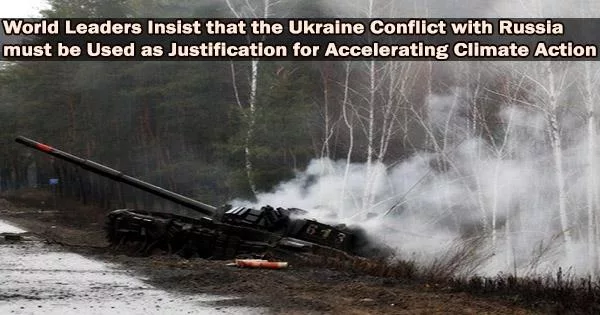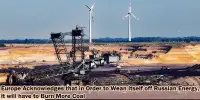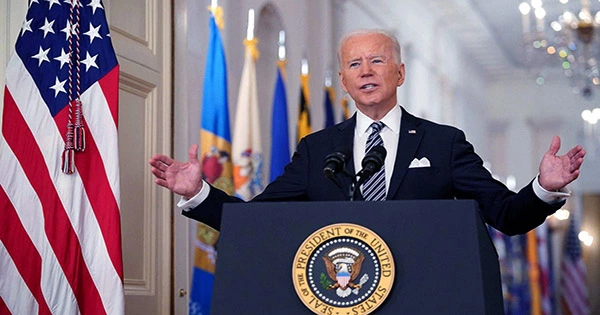On the opening days of the U.N.’s premier climate meeting, world leaders spoke on stage to stress that immediate action must be taken by all nations to avert catastrophic global warming in spite of Russia’s assault in Ukraine.
It had been argued that geopolitical problems, skyrocketing inflation, and an impending economic recession may prevent policymakers from taking action to mitigate the worst effects of human-induced climate change in the lead-up to the COP27 session, which began on Sunday.
World leaders on Monday and Tuesday convened in Egypt’s Red Sea resort town of Sharm el-Sheikh to deliver national statements on the battle to secure a livable future.
“Climate security goes hand in hand with energy security,” U.K. Prime Minister Rishi Sunak said at the U.N.-brokered talks.
Russian President Vladimir Putin’s “abhorrent war in Ukraine and rising energy prices across the world are not a reason to go slow on climate change. They are a reason to act faster,” Sunak said on Monday.
“Because diversifying our energy supplies by investing in renewables is precisely the way to insure ourselves against the risks of energy dependency.”
There is “no credible pathway” in place to keep global warming at 1.5 degrees Celsius, according to a flurry of key U.N. assessments that were released in recent weeks. These findings also provided a somber assessment of how near the globe is to experiencing catastrophic climatic breakdown.
The historic 2015 Paris Agreement set an aspirational temperature goal of 1.5 degrees Celsius.
Because of the increased likelihood of so-called tipping points over this level, it is acknowledged as a key global aim. Small adjustments can cause significant changes in the overall life support system of the Earth at these thresholds.
“We will not sacrifice our climate commitments under the energy threat from Russia and therefore all of the commitments made by nations must be held,” French President Emmanuel Macron said from Sharm el-Sheikh on Monday.
He also talked about the need for “energy sobriety” to transition away from fossil fuels and said countries in the global north and south “must come to terms with the idea of financial solidarity.”
‘We cannot backtrack on our commitments’
Portugal’s prime minister, Antonio Costa, stated on Tuesday that the European nation began investing in renewables 15 years ago and is now a perfect example of how making the switch away from fossil fuels through investment made Portugal safer from a fuel crises.
Costa added that Portugal had given up coal eight years sooner than anticipated and did not anticipate that the impact from the Ukraine war would make it change its mind.
“We cannot backtrack on our commitments,” Costa said, according to a translation.
According to a study released last month by the energy think tanks E3G and Ember, since the start of Russia’s conflict in Ukraine in late February, wind and solar energy have produced 25% of the European Union’s electricity. Record growth is thought to have prevented the consumption of 8 billion cubic meters of gas at a cost of $11 billion euros ($11 billion).
In addition to the climate benefits of shifting away from gas, a fossil fuel, analysts at E3G and Ember said this shows that “accelerating deployment of cheap renewable energy will reduce Europe’s exposure to costly fossil fuels.”
At the same time, the EU’s plans to reduce carbon emissions have been in jeopardy due to Russia’s invasion of Ukraine. Following a prolonged period of decreased Russian gas flows, certain European governments have been pushed to reevaluate coal, one of the dirtiest and most polluting energy production methods.
Germany, Italy, Austria and the Netherlands have all indicated that coal-fired plants could be used in the short term to compensate for a cut in Russian gas supplies. European countries have also announced plans to build new liquefied natural gas terminals and extend the region’s network of gas pipelines.
‘Unacceptable, outrageous and self-defeating’
U.N. Executive Secretary Antonio Guterres said at COP27 on Monday that “the war in Ukraine, conflict in the Sahel, and violence and unrest in so many other places are terrible crises plaguing today’s world.”
“But climate change is on a different timeline and a different scale. It is the defining issue of our age,” he added.
Guterres warned that it would be “unacceptable, outrageous and self-defeating” to put climate action on the back burner, highlighting that many conflicts around the world were linked with “growing climate chaos.”
“The war in Ukraine has exposed the profound risks of our fossil fuel addiction,” he continued. “Today’s urgent crises cannot be an excuse for backsliding or greenwashing. If anything, they are a reason for greater urgency, stronger action and effective accountability.”
















